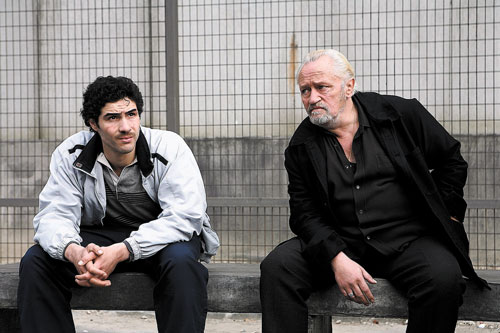‘A Prophet’
When you have no life, you take the life you can find. Even if it means living your life by taking others' lives.
Such is the simple yet wrenching premise behind the Oscar-nominated "A Prophet," which captured one of the top awards at last year's Cannes film festival -- and won nine Cesars, France's Academy Award equivalent, including best picture.
But citing "A Prophet's" awards pedigree isn't really the point. Doing that diminishes the impact and immediacy of a movie notable for what it isn't as much as for what it is.
A prison drama, crime thriller and character study rolled into one, "A Prophet" (in French, Arabic and Corsican, with English subtitles) doesn't sentimentalize or sensationalize its subject matter or characters. It merely presents them, the circumstances of their lives -- and the life-or-death consequences that accompany their decisions.
Not that there's much room to maneuver.
Especially not for "A Prophet's" title character, Malik El Djebena (Tahar Rahim).
When we first meet Malik, he's a friendless, virtually illiterate 19-year-old about to begin a six-year sentence at a French prison. For what, we don't quite know -- not that it matters.
The scars on Malik's face and back testify to the rough-and-tumble life he's led so far.
But life's about to get a lot tougher, as he discovers when the prison's resident crime boss, crafty Corsican Cesar Luciani ("The Diving Bell and the Butterfly's" Niels Arestrup ) orders Malik to murder a fellow inmate -- thereby preventing him from testifying against Cesar. Conveniently, this inmate (Hichem Yacoubi ) already has propositioned Malik, so Cesar knows Malik will be able to get up close and personal -- close enough to slit his target's throat with a razor blade.
And if Malik doesn't do Cesar's bidding, he'll be the one to die.
Malik's understandably shocked -- and utterly certain he couldn't possibly kill anyone. But he's also utterly certain he has no other alternative.
This bloody murder (and is it ever bloody) is merely the first step in Malik's education, which finds him learning to read -- and learning how to maneuver nimbly among the prison's antagonistic ethnic factions, whether it's Cesar's Corsican partners in crime or the "dirty Arabs" they so frequently demean.
Through it all, Malik keeps his mouth shut and his eyes open. Sometimes he sees visions of the man he murdered. And sometimes he sees visions all his own, visions that remind him of how much he's learned -- and how much that knowledge has changed, and will change, his life. Assuming it lasts beyond prison, that is.
Director and co-writer Jacques Audiard ("The Beat That My Heart Skipped," "Read My Lips") has a flair for energizing genre movie conventions with idiosyncratic, imaginative style.
So, despite the fact that "A Prophet's" set-up is straight out of an old Hollywood prison pic -- with corrupt guards and wily crime bosses pulling strings from behind bars -- Audiard finds new angles to explore.
One of them is the movie's exotic (at least to us) ethnic mix, which offers intriguing insights into France's immigrant Arab Muslim population.
Another involves not only the knowledge of power but the power of knowledge -- and how Malik's growing understanding of how the world works informs not only his day-to-day quest for survival but his plans for life after prison.
Along the way, Audiard demonstrates an assured command of mood and tone, shifting from graphic, in-your-face violence to sudden surrealism. He even finds ethereal grace notes of unexpected beauty, as when Malik reaches from behind bars to catch falling snowflakes in his hand.
Occasionally, "A Prophet's" sprawling cast and through-the-years narrative structure make it seem as if we're serving all six years of Malik's sentence alongside him, but even when the storytelling pace drags a bit, there's a wealth of character detail to keep us involved.
Much of the detail involves Arestrup (who also co-starred for Audiard in "The Beat That My Heart Skipped"), who brings a quiet, coiled-snake intensity to his role as Malik's mentor -- and overseer.
He's undeniably magnetic -- often more so than "A Prophet's" title character.
But that's by design. After all, Malik is no criminal mastermind. As newcomer Rahim plays him, he's a blank slate, a skinny kid who can barely grow a moustache -- and barely write his name. But, as "A Prophet" reveals, he learns many things. How to kill, of course, but also how to live. He's open to everything, and in Rahim's understated, almost inscrutable performance, we can't help but see ourselves in him.
Contact movie critic Carol Cling at ccling@reviewjournal.com or 702-383-0272.
Review
"A Prophet"
154 minutes
R; strong violence, sexual content, nudity, profanity, drug use
Grade: B+
at the Suncoast
Deja View
From the dawn of the talkies, prison dramas have had a permanent place on the silver screen. A few vintage favorites:
"The Big House" (1930) -- With everything from tough-guy inmates to prison breaks, the Oscar-winning prison drama (featuring Robert Montgomery, Wallace Beery and Chester Morris) set the pattern for its successors.
"Castle on the Hudson" (1940) -- John Garfield's the rebellious convicted mobster and Pat O'Brien's the reform-minded warden in this remake, an improvement on the 1932 original, "20,000 Years in Sing Sing."
"Brute Force" (1947) -- At an overcrowded penitentiary, a tough inmate (Burt Lancaster) leads a plot to take down the sadistic chief guard (Hume Cronyn).
"Riot in Cell Block 11" (1954) -- Producer Walter Wanger's experience in prison inspired "Dirty Harry" director Don Siegel's hard-hitting tale of inmates (led by Neville Brand) who take their brutal guards hostage.
"Cool Hand Luke" (1967) -- In one of his signature roles, Paul Newman plays the rebellious title loner, who clashes with a brutal chain-gang boss (George Kennedy).
-- By CAROL CLING














